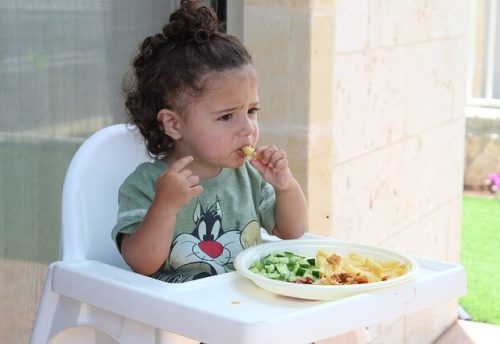
Why You Shouldn’t Fight In Front Of Your Child
Before we head into the topic. I want you to answer this question. Do you feel safe in the dark with scary noises all around you? Any person in their sane mind would answer no.
This is an almost accurate description of how your young kids would feel if you fight around them. They are too innocent to know what’s happening and why it’s happening. Imagine all that fear, anxiety and a cocktail of negative emotions.
Marital quarreling was inevitable but there has to be a better way to handle it. Conflict is a normal part of everyday experience, so it’s not whether parents fight that is important.
It’s how the conflict is expressed and resolved, and especially how it makes children feel that has important consequences for children.
What is a Destructive Conflict?
- Verbal aggression like name-calling, insults, and threats of abandonment;
- Physical aggression like hitting and pushing;
- Silent tactics like avoidance, walking out, sulking, or withdrawing;
- Capitulation—giving in that might look like a solution but isn’t a true one.
When parents repeatedly use hostile strategies with each other, some children can become distraught, worried, anxious and hopeless.
Others may react outwardly with anger, becoming aggressive and developing behavior problems at home and at school.
Children can develop sleep disturbances and health problems like headaches and stomachaches, or they may get sick frequently.
Their stress can interfere with their ability to pay attention and create learning and academic problems at school.
Most children raised in environments of destructive conflict have problems forming healthy, balanced relationships with their peers.
Even sibling relationships are adversely affected—they can become over-involved and overprotective of each other, or distant and disengaged.
Some research suggests that children as young as six months register their parents’ distress.
Studies that follow children over a long period of time show that children who were insecure in kindergarten because of their parents’ conflicts were more likely to have adjustment problems in the seventh grade.
A recent study showed that even 19-year-olds remained sensitive to parental conflict.
When there is a conflict between parents, there are differences in how children react depending on their sex: Boys tend to withdraw, and girls try to get involved.
This places more of a burden on the children because they blame themselves if fights continue to flare up.
Here are a few negative effects on children when parents fight in front of them:
- Guilt and Shame:
Children often believe that they are the reason for their parents’ fighting and end up feeling guilty. This can be emotionally distressing for them. - Low Self Esteem:
Insecurity, feeling of guilt and shame can make your little one unwanted and unworthy. This, in turn, results in low self-esteem which can be permanent and damaging in his long-term personal and professional relationships. - Stressed about Taking Sides:
Children generally want to please both parents, and the pressure to take sides in a conflict can be distressing for them. They might not understand the basis of the conflict and take a side which might blow up the conflict to even bigger proportions. - Poor Parenting and Sloppy Role Models:
Children soak in whatever this see and learn from their parents in their formative years. As role models, if we use unhealthy communication like parents arguing in front of the child, chances are very high that the little ones will grow up and demonstrate the same behavior with their family and peers. - Poor Academics and Behavioural Issues:
A child witnessing chronic parental fights finds difficulty in concentrating. He might also have frequent health problems and show either rebellious or introvert behavior in school. Children from such homes have also been seen to be more prone to substance abuse as they grow up. This is a physically harmful impact of parents fighting on children. - Insecurity
A home is a child’s heaven of love and care. Parents fighting in front of kids results in chaos and tension, leaving the child frightened, anxious and helpless. This feeling of insecurity can last a lifetime and create serious behavioral issues later.
So, here are a few tips you need to follow to give your children a safe and peaceful environment to grow in:
- Count to 10 or leave the room to keep from arguing when you are very upset. If you do get angry, reassure your children by telling them that fights happen, but you do love each other and it’s not the children’s fault. Makeup, but don’t fake it. Children will know if you are faking.
Keep it private and use a separate room whenever you feel things are going to turn loud. - If a fight does happen in front of your kids, remember to apologize and explain that he’s not the reason for the same.
- Pen down your thoughts on a piece of paper to be taken up later with your partner.
- In case the above doesn’t work you need to seek a mediator or professional help.
- Remember that you’re on the same team. Deal with issues by laying all the cards on the table and looking at them together to solve a dilemma rather than digging in on opposing sides. Then problem-solve with one another.
- Give your partner the benefit of the doubt: Assume the best intentions and help yourself remember that you love each other by adding an endearment.
- Constructive criticism only works when your partner can do something about what happened. If the deadline for soccer signup was already missed, remedy the current situation as best as possible and talk about how to do it better next time. Blaming won’t fix anything that’s already happened.
- Anything that needs to be said can be said with kindness. Disapproval, disappointment, exasperation—all can be handled better with kindness.
- Lead with empathy: Open the dialog by first letting the other person know that you see them, you get them, and you can put yourself in their shoes.
Well, these were the few reasons for Why You Shouldn’t Fight In Front Of Your Child.
If you like it, share it with your friends.
Need help?
We are the preschool franchise in India. Contact Us, message us for any issues. We will love to help you.





Leave a Reply